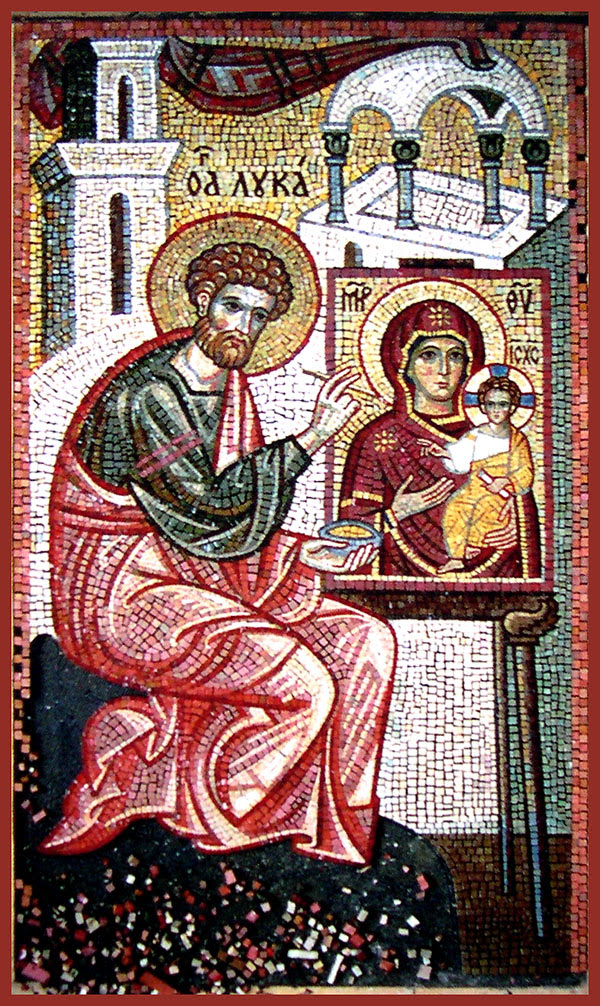The entire world has found you to be a great champion in times of peril; for you put the heathen to flight, O victorious one. As you brought to naught the boasts of Lyaeus, and gave courage to Nestor in the stadium, in the same way, O Holy Great Martyr Demetrios, entreat Christ God, that He grant us great mercy.
Apolytikion of St. Demetrios the Great Martyr
Dear Brothers and Sisters in Christ,
Tomorrow, October 26th, with abundant joy, the Church celebrates The Great Martyr Demetrios the Myrrh-Flowing of Thessaloniki. He was the son of a Roman proconsul in Thessaloniki. Three centuries had elapsed and Roman paganism, spiritually shattered and defeated by the multitude of martyrs and confessors of the Savior, intensified its persecutions. The parents of Saint Demetrios were secret Christians, and he was baptized and raised in the Christian Faith in a secret church in his father’s home. Imagine, the Great Apostle Paul had established the Church in Thessaloniki, and though it continued to grow from his first apostolic visit, polytheistic roots and the violent, pagan nature continued wage war against the gentleness of Christ.
By the time Demetrios had reached maturity and his father had died, Emperor Galerius Maximian had ascended the throne (305). Maximian, confident in Demetrios’s education as well as his administrative and military abilities, appointed him to his father’s position as proconsul of the Thessaloniki district. The young commander’s principal duties were to defend the city from barbarians and to eradicate Christianity. The Emperor’s policy regarding Christians was expressed simply: “Put to death anyone who calls on the name of Christ.” The Emperor did not suspect that by appointing Demetrios he had provided him with the opportunity to bring many people to Christ.
Accepting the appointment, Demetrios returned to Thessaloniki and confessed and glorified our Lord Jesus Christ. Instead of persecuting and executing Christians, he began to teach the Christian Faith openly to the inhabitants of the city and to overthrow pagan customs and the worship of idols. The compiler of his Life, Saint Simeon Metaphrastes (November 9), says that because of his teaching zeal he became “a second Apostle Paul” for Thessaloniki, particularly since “the Apostle to the Gentiles” founded the first community of believers in the city (1 Thess. and 2 Thess.).
The Lord also destined Saint Demetrios to follow Saint Paul on the path to martyrdom. When Maximian learned that the newly-appointed proconsul was a Christian, and that he had converted many Roman subjects to Christianity, the Emperor’s rage knew no bounds. Returning from a campaign in the area of the Black Sea, the Emperor decided to lead his army through Thessaloniki, determined to massacre the Christians.
Learning of this, Saint Demetrios ordered his faithful servant Lupus to give his wealth to the poor saying, “Distribute my earthly riches among them, for we shall seek heavenly riches for ourselves.” He began to pray and fast, preparing himself for martyrdom.
When the Emperor came into the city, he summoned Demetrios, who boldly confessed himself a Christian and denounced the falsehood and futility of Roman polytheism. Maximian ordered Demetrios to be thrown into prison. An Angel appeared to him, comforting and encouraging him.
Meanwhile the Emperor amused himself by staging games in the circus. His champion was a German by the name of Lyaeos. He challenged Christians to wrestle with him on a platform built over the upturned spears of the victorious soldiers. A brave Christian named Nestor went to the prison to Saint Demetrios, his instructor in the Faith, asking for his blessing to fight the barbarian. With the blessing and prayers of Saint Demetrios, Nestor defeated the fierce German and hurled him from the platform onto the spears of the soldiers, just as the murderous pagan would have done with the Christian.
The enraged commander ordered the execution of the holy Martyr Nestor (October 27) and sent a guard to the prison to kill Saint Demetrios. At dawn on October 26, 306 soldiers appeared in the Saint’s underground prison and ran him through with lances. His faithful servant, Saint Lupus, gathered up the blood-soaked garment of Saint Demetrios he took the imperial ring from his finger, a symbol of his high status, and dipped it in the blood. With the ring and other holy things sanctified the blood of Saint Demetrios, Saint Lupus began to heal the infirm. The Emperor ordered his soldiers to arrest and kill him.
The body of the holy Great Martyr Demetrios was cast out for wild animals to devour, but the Christians took it and secretly buried it in the earth.
During the reign of Saint Constantine (306-337), a church was built over the grave of Saint Demetrios. A hundred years later, during the construction of a majestic new church on the old spot, the incorrupt relics of the holy martyr were uncovered. Since the seventh century a miraculous flow of fragrant myrrh has been found beneath the crypt of the Great Martyr Demetrios, so he is called “the Myrrh-Flowing.”
St. Demetrios is not only among the most popular and much-loved saints within Mediterranean culture, but in the Slavonic world, as well. He was an inspiration and protector of the youth in his contemporary time. To this day, he is regarded as a patron saint to children and the vulnerable. May his prayers continue to guide, strengthen, and instruct in the ways of Christ and His Gospel.
Holy Saint Demetrios, Intercede for Us!
With Much Love in Christ,
Fr. Anthony Savas
Protopresbyter

